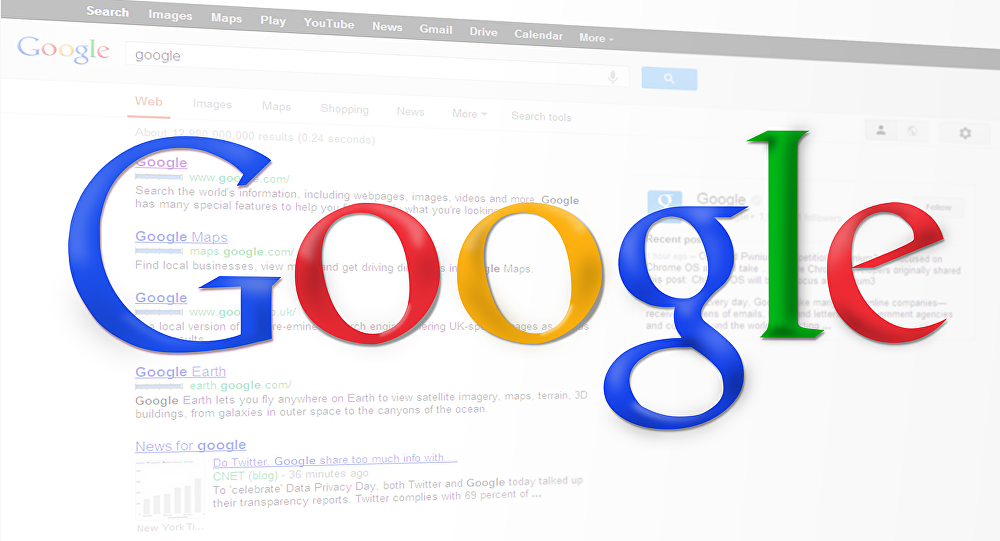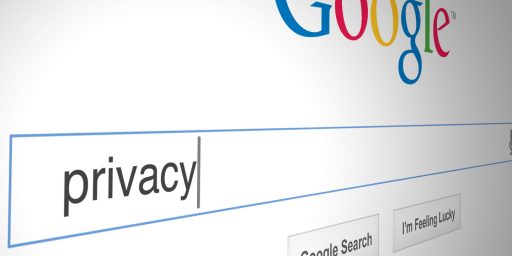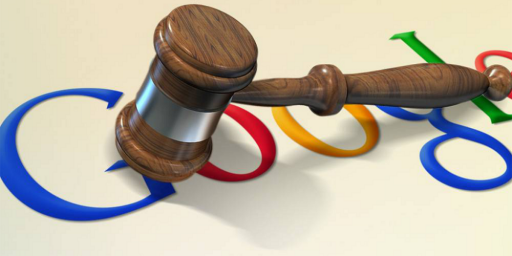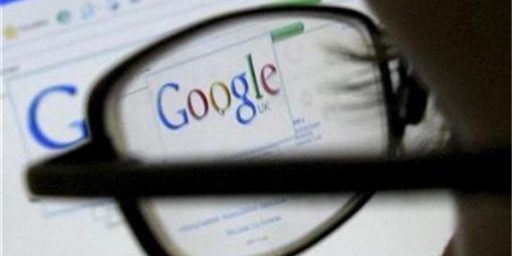The Enshittification of Google?
Has the search goliath gotten worse?

The Atlantic‘s Charlie Warzel points to “The Tragedy of Google Search,” claiming that “a giant of the modern web is buckling under its own weight.”
What is Google Search in 2023? A site that started 25 years ago as a list of blue links has mutated beyond recognition. Today, Google isn’t just an index to help sort through the endless libraries of online information—it’s a reference guide for the physical world too, having mapped most corners of the Earth and cataloged its contents. It is part encyclopedia and part predictive engine, guessing what you might be typing or thinking, serving information based on what others before you typed. It is Moviefone and the stock ticker, a well-trained chatbot, an image repository, a shopping mall.
It is also, like the modern web, creaking under the weight of its enormous size and an infinitely renewable supply of content, both human- and AI-generated. Unlike its streamlined, efficient former self, Google Search is now bloated and overmonetized. It’s harder now to find answers that feel authoritative or uncompromised; a search for healthy toddler snacks is overloaded with sponsored product placement, prompts to engage with “more questions” (How do you fill a hungry toddler? “Meat and Seafood. Bring on the meat!”), and endless, keyword-engorged content. Using Google once felt like magic, and now it’s more like rifling through junk mail, dodging scams and generic mailers.
Interestingly, while I’ve had the same general experience, it’s not true with respect to the specific example: I have to scroll down quite far on a search for healthy toddler snacks to get crap results—which are quite obviously Google Shopping adds to purchase various snacks that one might indeed feed to a toddler.
It’s fitting, then, that as the shine has worn off, Google has also found itself in an unusual moment of vulnerability. The company is on trial and scrambling internally to maintain relevance in the generative-AI era. Over the next several weeks, the Justice Department and a group of states will argue that the company violated antitrust laws by striking deals to protect its monopoly position in the online-search business. It all feels less like a midlife crisis than an existential one.
He dives a bit into the case, having a more sympathetic view of the DOJ’s position than mine, but that’s not what interests me here.
Google’s stagnation has trickled down to its products. Search has grown bloated with advertisements and widgets that prioritize its own services, such as Shopping, Finance, and Maps, over organic results. Although the company constantly updates and tweaks its algorithms, which are powered by natural-language-processing AI tools, there is a creeping sense—among frustrated programmers, searchers, and even journalists—that the site is no longer as useful or intuitive as it once was. One reason for this feeling may be that Google’s algorithms have been successfully gamed by low-quality websites and search-engine-optimization companies that help their clickbaity clients show up in the first page of Google Search results. An SEO expert named Marie Haynes suggested to me last year that Google’s algorithms are getting better but that the website is going through a transitional period—the engine is still working out the kinks. In response to a request for comment, a spokesperson for Google said, in part, “We make thousands of quality improvements every year to ensure we’re delivering the most helpful results, and we’ve developed entirely new ways to search, which is why people around the world continue to use and love Search.”
But none of this is remotely new. I was working hard to optimize OTB for Google (and, especially, Google News) rankings at least 17 years ago. There was a period when blogs, particularly those who followed solid SEO practices, ranked ahead of mainstream media outlets like the NYT and WaPo on posts built off of NYT and WaPo stories. Eventually, that stopped. OTB’s content does still appear in Google News (I can find my previous post, from an hour or so go, there now) but it’s much less prominent—probably appropriately so. (And, searching my archives for links to refresh my memory on timeline, I see that Google actually banned BMW and Ricoh, entities substantially more prominent than OTB, back in 2006 for attempting to game their search rankings.)
Still, there are indicators that the product might continue to struggle to deliver high-quality search results on an internet soon to be flooded with AI-generated photos, videos, and text. Just this week, 404 Media reported that the top Google result on a search for the Tiananmen Square “tank man” was, for a period of time, an AI-generated image of the man taking a selfie. Last fall, the former Googler and ex–Yahoo CEO Marissa Mayer offered a charitable explanation as to why Google Search feels worse, arguing that the search engine is merely a reflection of the internet as a whole, which has become more complex and laden with fraudsters and garbage. The explanation lets Google off the hook a bit: The company’s chief purpose is to navigate the sprawling morass of information, after all. Ultimately, it’s a tacit admission that Google has tried and failed to tame the web.
But, again, this is a longstanding problem. Way back in 2011, I was decrying (and others were laughing about) the Google bombing of Rick Santorum to return an obscene search result. And way back in 2006, pranksters for a time made President Bush the main search result for “miserable failure” until the company intervened.
Google Search is arguably the most important innovation of the commercial internet—a modern marvel that has forever changed how billions of people access information. Its success, especially early on, felt like a small miracle. But Google Search is also a tragedy: The democratization of information demanded the invention of a behemoth that could successfully handle the abundance of the web. But chasing scale is a dangerous, unwinnable game. Perhaps the real lesson of Google’s story is that you can try to iterate, but ultimately, no company or product can grow alongside the internet forever without, eventually, being swallowed up.
Maybe! But, even if part of the answer for the company’s continued dominance of the search enterprise is its leveraging of its quasi-monopoly power, the fact of the matter is that no one else is doing it better.
Two Sundays ago, in response to another Warzel essay, I wrote about the “Enshittification of Streaming.” There’s little doubt that some of the same is happening with search. It is a longtime axiom of the tech enterprise that, “If you are not paying for it, you’re not the customer; you’re the product being sold.” (Precursors of the idea date to at least 1973.) As with television, radio, newspapers, and other endeavors that cost more to produce than they can recoup from consumers, advertising makes up the gap. The twist that Google and others have added is that they both sell ads and mine customer data to better target their ads.
Still, while I’m only tangentially their customer (I do pay them for additional storage), I continue to prefer Google’s search, mail, maps, and browser to the available alternatives. Even though I’m a longtime iPhone user and recent MacBook convert, I still prefer Google’s maps and browser on those devices to the organic Apple versions (although, admittedly, Apple Maps is catching up).






Yeah, google search has gotten bad, but so have the others. I’ve been using DuckDuckGo on my phone for a few years, that is repackaged Bing and I typically need to scroll through 5-10, sometimes repeated ads to get useful search results.
The ever present need for revenue growth, again ruins good things.
I get better results when searching for information not related to items or services for sale. Like, “how much tritium do you need for an h bomb.” Otherwise one needs to get very specific. If I want reviews of products, I include “review” in the query. Otherwise it’s all ads.
What stumps me sometimes is asking for specific info and getting ads. For example, I’ll type “air distance between NYC and London,” and get lots of offers for tickets JFK-LHR, Not every time, but often.
I’m reminded of something I read back in the dark ages of using Alta Vista to search the web. I think I read it in The New Republic (which was a print magazine in those days) but am no longer sure of the source. I remember the content because I’ve noted many times to many people. To wit, there are two things to remember about the World Wide Web:
First, it is not a library, it is a shopping mall.
Second, it’s not about information, it’s about commerce.
I’ve never gone wrong remembering these two things.
I use Google frequently for work, both as one research tool, and also for SEO, and I think Google has gotten materially worse. Unfortunately, the alternatives are not any better.
Google is trying to integrate these other products into search in a way that will allow them to claim that they are integral to search — a natural extension of search — and not just an attempt to leverage monopoly power into other markets.
I would claim they have done the same with their ads product — there are lots of ways that you could introduce competition among ads networks, but Google has everyone convinced that search and ads are one and the same.
In my experience, Google searches have become, if not quite total crap, definitely getting down there. I can still use Google Scholar and get good material, but otherwise I now usually start with looking up a bunch of search terms in Wikipedia and then start chasing pointers.
I am a programmer. I do this every day. I use Google to help me. It works. It works well. Sometimes there isn’t an answer to the question I pose, and I have to try a different way to solve my problem, or a different question to ask, because how I said things isn’t how people talk about it.
This is how it has always been. Since Google. Before Google? … (Brrrr, don’t make me go back!)
And yes, really common queries often get kind of polluted responses as lots of advertisers have paid for results to those searches. I think the complaint is overblown. Some people just don’t like Google, which is kind of enormous and that makes them uncomfortable.
OTOH, it is still SO much better than Bing/Microsoft Edge Chromium forced searches.
So say we all.